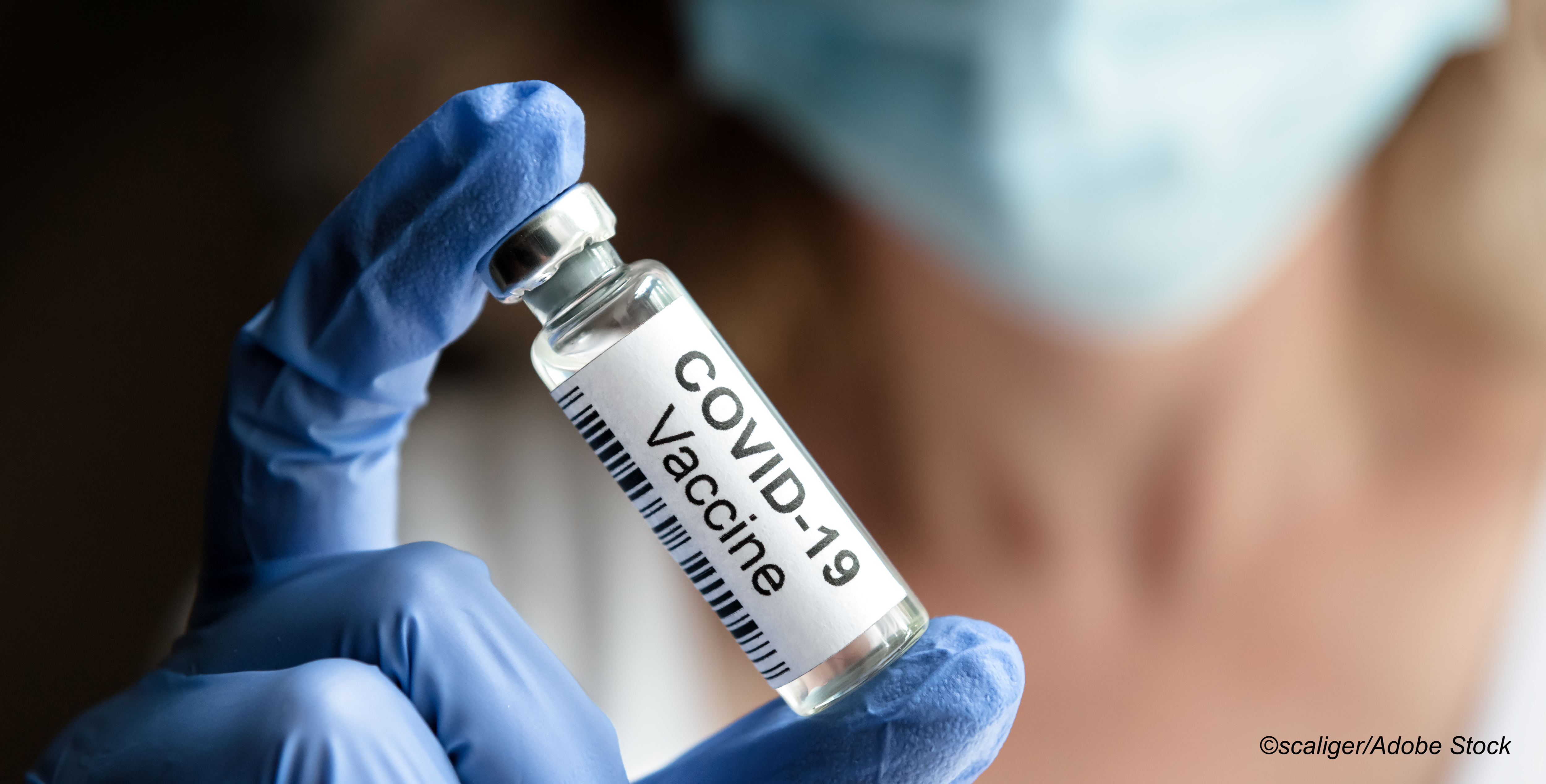Among multiple sclerosis (MS) patients on disease-modifying therapies (DMTs), treatment with sphingosine-1-phosphate receptor modulators (S1P) and anti-CD20 monoclonal antibody therapies were associated with lower IgG immune response to vaccination against Covid-19 compared to treatment with other DMTs, researchers report.
This finding was presented this week by several researchers at the 37th Congress of the European Committee for Treatment and Research in Multiple Sclerosis (ECTRIMS 2021).
One of the studies, presented as a late-breaking abstract, involved analysis of blood samples collected from healthy controls and patients with multiple sclerosis taking different DMTs before and after vaccination with either the BNT162b2 or mRNA-1273 vaccines or the Ad26.COV2.S adenovirus-vectored vaccine.
The analysis showed quantitatively similar antibody responses to the vaccines among the healthy controls and MS patients on the disease-modifying treatments glatiramer acetate (GA), dimethyl fumarate (DMF), and natalizumab (NAT).
Responses to the vaccine were markedly reduced, however, in patients on S1P receptor modulator treatments and the anti-CD20 monoclonal antibody therapies ocrelizumab and rituximab.
Detectable CD19+ B cells and shorter duration of disease modifying treatment were associated with improved antibody responses in patients on anti-CD20 treatments.
“Antibody responses were significantly reduced in patients treated with S1P receptor modulators and rituximab and ocrelizumab,” said researcher Joseph Sabatino, MD, PhD, of the University of California, San Francisco, in a video presenting the study findings. “However, it is important to note that antibody responses in these three treatment groups were variable, with some patients having undetectable antibody responses and others having quite high levels of antibodies.”
CD4+ and CD8+ T cell responses were similar across most MS treatment groups, but treatment with S1P receptor modulators was associated with blunted CD4+ T cell responses in the study.
A separate analysis involving close to 500 MS patients vaccinated with one of the three FDA-approved Covid-19 vaccines found B-cell depleting treatment and SP1 receptor modulators to be associated with lower SARS-CoV-2 vaccine conversion.
Humoral response >0.4 index was considered positive for SARS-CoV-2 IgG antibodies and >1.0 index for semi-quantitative and spike-1 IgG antibodies suggestive of acquired immunity.
A total of 334 (75.6%) of 442 patients achieved spike-1 IgG seroconversion and 16 (33.3%) of 48 patients had IgG seroconversion after full vaccination. Seventeen (89.5%) of 19 patients with laboratory confirmed positivity to SARS-CoV-2 before vaccination had spike-1 IgG seroconversion following vaccination.
Seroconversion rates ranged from 80% to 100% among patients on various DMTs, with the exception of S1P receptor modulators and B-cell depleting therapies. Among these patients, seroconversion rates were 26.3% (5 of 19 patients) and 22.6% (21 of 93 patients), respectively (P<0.001).
Five of 473 followed patients (1.1%) tested positive for SARS-CoV-2 after full vaccination, with three of these breakthrough patients failing to seroconvert and two having high spike-1 IgG after vaccination. One breakthrough case in a patient who did not seroconvert required hospitalization.
In a third study exploring IgG immune response to Covid-19 vaccination among MS patients in the U.S., Germany, and Spain enrolled in Biogen’s MS PATHS network, researchers analyzed post-vaccination serum samples from 322 MS patients on various disease modifying therapies who were fully vaccinated as of late August of this year.
Post-vaccination serum samples were collected an average of 47 days after the last dose of vaccine, and the patient cohort included in the analysis was 74% female and 64% White. Roughly 9-out-of-10 patients received mRNA vaccines.
Post vaccination testing showed 100% IgG reactivity (IgG index >1) among patients on no DMT, as well as those on teriflunomide, natalizumab, interferons, glatiramer acetate, fumarates, and alemtuzumab.
Significant reductions in IgG response were associated with treatment with the S1P receptor modulators fingolimod, ozanimod, and siponimod, and with the anti-CD20 therapies.
Specific IgG rates from initial post-vaccination testing (28-90 days after full vaccination) were 40% (32 of 80 patients) among those on anti-CD20 DMT and 41% (16 of 39 patients) among those on S1P receptor modulating therapies.
Patient characteristics did not influence IgG reactivity, and no association was seen between reactive IgG status and MS subtype. There was also no correlation between time from last treatment with a disease modifying therapy and IgG response.
Researcher Jeffrey Cohen, MD, of the Cleveland Clinic, who is a consultant for Biogen, presented the study findings by video at ECTRIMS 2021.
“These initial results suggest that in fully vaccinated people with MS, anti-CD20 and SP1 receptor modulator therapies reduce IgG response to SARS-CoV-2 vaccination,” Cohen said. “The response was preserved with other DMTs.”
A study limitation cited by Cohen was the lack of pre-vaccination specimens.
“This issue is being addressed by ongoing analysis of anti-nucleocapsid IgG response, to give an indirect indication of immunity from prior virus exposure,” Cohen added.
-
Among multiple sclerosis patients on disease-modifying therapies, treatment with sphingosine-1-phosphate receptor modulators (S1P) and anti-CD20 monoclonal antibody therapies was associated with lower IgG immune response to vaccination against Covid-19 compared to treatment with other DMTs.
-
Quantitatively similar antibody responses to the Covid-19 vaccines were seen among the healthy controls and MS patients on the disease-modifying treatments glatiramer acetate (GA), dimethyl fumarate (DMF) and natalizumab (NAT).
Salynn Boyles, Contributing Writer, BreakingMED™
Weinstock-Guttman reported serving as a speaker or consultant for Biogen, Novartis, Genzyme; Sanofi, Genentech, Abbvie, Bayer AG, and Celgene/ BMS; receiving grant/research support from these sponsors as well as Mallinckrodt Pharmaceuticals, Inc. and serving on the editorial board for BMJ Neurology, Journal of International MS and CNS Drugs.
In the study by Weinstock-Guttman and colleagues, none of the researchers reported disclosures related to the research presented. Weinstock-Guttman reported receiving consulting and/or speaking fees from Biogen, Novartis, Genzyme, Sanofi, Genentech, Abbvie, Bayer AG, and Celgene/BMS.
Jeffrey Cohen reported sering as a consultant for Biogen and also receiving personal compensation from Adamas, Atara, Bristol-Myers Squibb, Convelo, MedDa and Mylan and serving as editor of Multiple Schlerosis Journal. Other researchers in the MS PATH were employees of Biogen.
Cat ID: 130
Topic ID: 82,130,730,933,130,36,709,192,927,925,934,708



